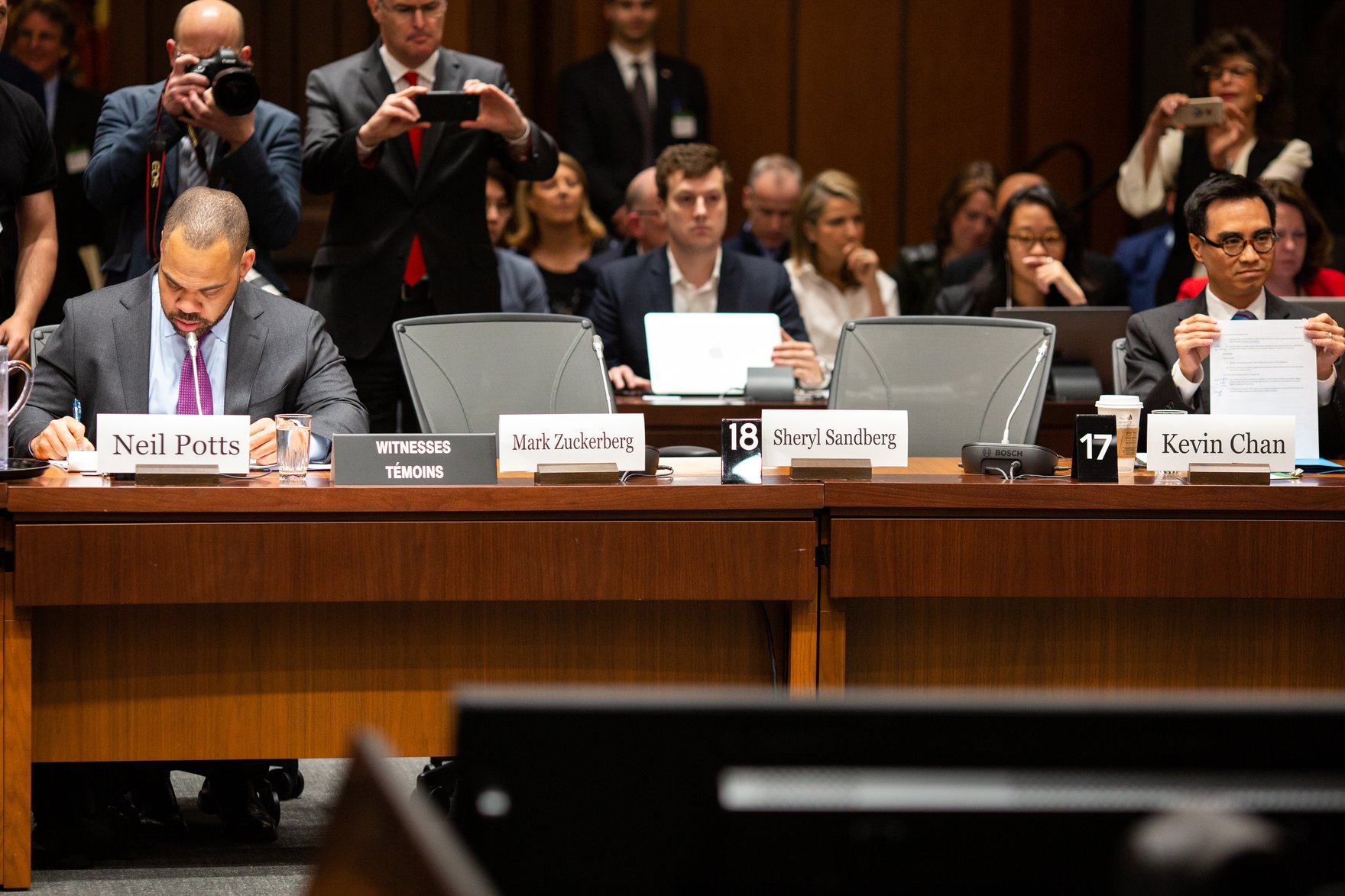In May 2019, I had the honour of testifying before the International Grand Committee on Big Data, Privacy and Democracy (IGC) in Ottawa. The IGC first met in November 2018, when the UK Digital, Culture, Media and Sport Committee gathered 24 representatives from nine countries for a hearing. At the May hearing (the committee’s second meeting), the IGC expanded its participant list to include representatives from St. Lucia, Mexico and Estonia, among other places. Although subpoenaed again to appear before the IGC, this time by Canada’s parliamentary ethics committee, Mark Zuckerberg again refused to show.
Zuckerberg’s absence and the growing list of participants are notable for one reason: the IGC is focused on international cooperation on digital affairs, in particular the actions of technology giants. Amazon, Apple, Alphabet (the parent company of Google and YouTube), Facebook (which also owns Instagram and WhatsApp) and Microsoft (owner of LinkedIn) together comprise one-seventh of the total value of the American stock market.
International governmental cooperation on digital affairs seems like a new field without examples of best practice. But governments have long worked together to regulate particular aspects of communications technologies. To help us in the present, we can look to lessons learned from history. In this case, history suggests that governments would be wise to focus on more operational aspects rather than on questions of content. This means questions like technical standards, privacy, interoperability, dispute resolution mechanisms and competition policy.
The power of current, market-dominating technology companies bears a family resemblance to some of the first major multinational enterprises: submarine cable companies that emerged in the mid-nineteenth century.
The power of current, market-dominating technology companies bears a family resemblance to some of the first major multinational enterprises: submarine cable companies that emerged in the mid-nineteenth century. They used new methods such as joint-stock companies to mobilize capital, and they were some of the first firms to be run according to the principles of managerial capitalism (meaning that capital was separated from control). As Simone Müller and I have argued, these methods made the companies cornerstones in the rise of capitalism as we know it.
By the early 1900s, these companies were under fire from reformers for their oligopolistic practices. Unlike the current platforms, these companies were using their market power to charge too much for telegrams. One British member of Parliament originally from Australia, Henniker Heaton, called himself the spokesperson for the “99 per cent of the population” cut off from global telegraphy by the high prices. While he rallied together a broad coalition, Heaton failed to change the companies’ policies.
There was a simple reason for this. Despite their importance, these companies existed in a blurry regulatory space. Headquartered in London, cable companies were subject to British law and, at least in some cases, to regulation under the International Telegraph Union (ITU), which was established to regulate electric telegraphic traffic between states. However, as private companies, submarine cable companies participated in ITU meetings and were able to stymie many ITU attempts to regulate them.
Still, the ITU did set technical standards in telegraphy. The organization emerged in the first place to mediate between two competing technical systems for telegraphy in Europe. The ITU ensured that there was one interoperable system that allowed telegrams to travel across borders.
The ITU’s experience with submarine cables set the tone for future technologies. International agreements continued through the arrivals of radio, satellite, television and the internet. These were often hard-fought battles. In the 1960s, Europeans and Americans debated furiously about the standards for satellites. But often enough, governments managed to compromise on technical standards that enabled integration or interoperability of communications infrastructures.
Such “technical” decisions could change market structures. Early wireless devices were not interoperable, as early inventor Guglielmo Marconi hoped to monopolize the market with his device. Then, in April 1912, the Titanic hit an iceberg. Many people were only saved because other ships heard the Titanic’s wireless distress signals. An International Radiotelegraph Conference in London three months later mandated interoperability between wireless devices. If a ship were to sink in the future, all ships nearby should be able to hear the distress calls. This apparently technical decision fundamentally changed the wireless market. It enabled other companies, such as the German firm Telefunken, to compete with Marconi.
Governments have been less successful, however, at coordinating on content standards. Since 1976, when the International Covenant on Civil and Political Rights (ICCPR) entered into force, there has been an international standard on freedom of expression. Articles 19 and 20 of the ICCPR state that everyone has the right to freedom of expression. The two articles allow for restrictions if provided by law, such as to respect the rights of others or to protect national security, public order or public health. Still, the principles of freedom of expression mean different things to different countries, even to different democracies. While the American approach enshrines only negative obligations to prevent the suppression of speech, European countries and Canada also believe in positive obligations to ensure a diversity of voices.
Currently, the large social media platforms are attempting something rather unprecedented by having global terms of service. We have seen in the last few years how various governments have sought to impose their own national laws on companies. The Network Enforcement Law (NetzDG) in Germany requires social media companies with more than two million unique users in Germany to respond to content flagged under German speech law within 24 hours. France is pushing through a similar law on hate speech, which is partly inspired by Germany’s law.
It is hard to imagine agreement over content standards between democracies, let alone between authoritarian states and democracies.
There is a clash, then, between the companies’ global terms of service and countries’ demands for adherence to national law. In some cases, the national laws themselves are concerning, such as the proposed fake news law in Singapore that gives the government greater power to mandate companies to remove news and to prosecute individuals for spreading information deemed false by the government. Just as we saw with previous technologies, it is hard to imagine agreement over content standards between democracies, let alone between authoritarian states and democracies.
A number of operational areas, however, might be well suited to international cooperation; competition policies, privacy standards, mandated interoperability and information sharing come to mind.
Any ideas about international cooperation must also reckon with the reality of the US government. The administration of President Donald Trump conspicuously abstained from signing the Christchurch call to eliminate terrorist and violent extremist content online. Voluntary agreements will be difficult.
Involving the United States in existing international frameworks is also likely to be a challenge. In 2018, the United States withdrew from the UN Human Rights Council one day after the United Nations’ human rights chief criticized US immigration policies of separating families at the border. This month, the US State Department announced the composition of a Commission on Unalienable Rights to provide “an informed review of the role of human rights in American foreign policy.” Critics fear that the Commission will harm LGBTQIA and reproductive rights, particularly because many members of the Commission are conservative religious scholars. It also showed the current administration’s more unilateral approach.
Any productive approach to international cooperation should consider what has worked in the past. The history of regulating older technologies indicates that countries will be hard-pressed to address content together. Governments have successfully coordinated operational standards, but not standards regulating content. The operational is also political; we need only think of the current fights over 5G cellular network standards. Still, it is possible to reach international agreement more readily on aspects affecting competition, tax or privacy, for example, than on content itself.
Whether or not Zuckerberg ever sits behind his placard at an IGC hearing, nations can address the governance issues posed by the Facebooks, Amazons and Alphabets of the world — as long as they do so together. In the face of such large companies, only international action on important regulatory issues will be fully effective.




